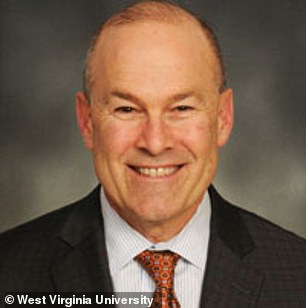West Virginia will soon being measuring the level of COVID-19 antibodies in vaccinated nursing home residents who received the shots early on.
The move comes after Pfizer-BioNTech released data earlier this week showing their vaccine’s efficacy falls to 84 percent after six months.
Nursing home residents were among the first to have the vaccine made available to them in December 2020, after the facilities quickly became sites of death and despair early in the pandemic.
State health officials believe that – if the data is correct – some early adopters of the vaccine not be as protected as they were just after receiving the shots.

West Virginia will soon begin research to find whether the state’s elderly population that received COVID-19 vaccines early in the rollout of the shots still have high antibody levels
Starting in August, nursing home residents who are five or more months removed from receiving the vaccine will be able to volunteer to join the research.
Their blood will be drawn and tested for COVID-19 antibodies.
Data from the research will be passed onto federal officials, who will consider it as they decide whether to approve to use of a booster vaccine shot.
‘Our goal is to advance knowledge and information that exists about the vaccines,’ Marty Wright, CEO of the West Virginia Health Care Association, told NBC.
While intentions may be noble, not all agree with the effort being undertaken by the Mountain State.

Dr Clay Marsh (pictured), one of West Virginia’s chief COVID advisors, says the state should put more energy in getting unvaccinated people jabbed rather than take part in this kind of research
‘In West Virginia, we were very aggressive in vaccinating our long-term care population, but we now worry and are paying more attention about whether we have sufficient immunity in those fully vaccinated,’ Dr Clay Marsh, executive dean for health sciences at West Virginia University and one of the state’s leading COVID advisors, tokd NBC.
The virus is beginning to surge in West Virginia, just as it is across the nation.
Over the past two weeks, cases have increased by 289 percent, from 67 per day on July 15 to 261 per day on July 29, according to data from the CDC.
Only 46 percent of West Virginians have received at least one dose of a COVID-19 vaccine, and just under 40 percent are fully vaccinated – both figures among the worst in the nation.
The state has not gone without trying to boost its low vaccine rates, though.
State officials held a vaccine lottery earlier this year, where prizes like cash, custom guns and custom trucks were awarded to vaccinated winners.
The effort proved not to do much to boost vaccination rates.
Another issue with the antibody tests is that they may not give a clear picture as to how protected a person is.

COVID cases in West Virginia are surging once again, up nearly 300% over the past two weeks
While it is believed that higher antibody levels produce more immunity to the virus, there are not yet any studies that prove it to be the case.
‘The question of whether antibodies are a marker of adequate immunity is one we have not answered yet,’ Dr Michael Wasserman, a member of the California vaccine advisory committee, told NBC.
Research finds that elderly people develop lower antibody responses to the vaccine.
A large portion of breakthrough cases – where a fully vaccinated person tests positive for the virus – are also among the elderly.
Discussions surrounding the need for a third dose have picked up in recent months.
Dr Anthony Fauci, director of the National Institute of Allergy and Infectious Diseases, has said in the past that he expects a third dose to be needed in the coming months.
Though, he said earlier this month that he does not expect booster shots to be needed for the fully vaccinated at this time.
Fauci said earlier this week, though, that those who are vulnerable to the virus even after vaccination still may require a third dose.
Pfizer also released data earlier this week showing that their vaccine’s booster shot could increase antibodies in the elderly 11-fold.
Other studies have also found that people who have received organ transplants can greatly benefit from a third dose of the vaccine.
Source link : https://www.dailymail.co.uk/health/article-9845301/West-Virginia-measuring-antibody-levels-elderly-dose-needed.html











